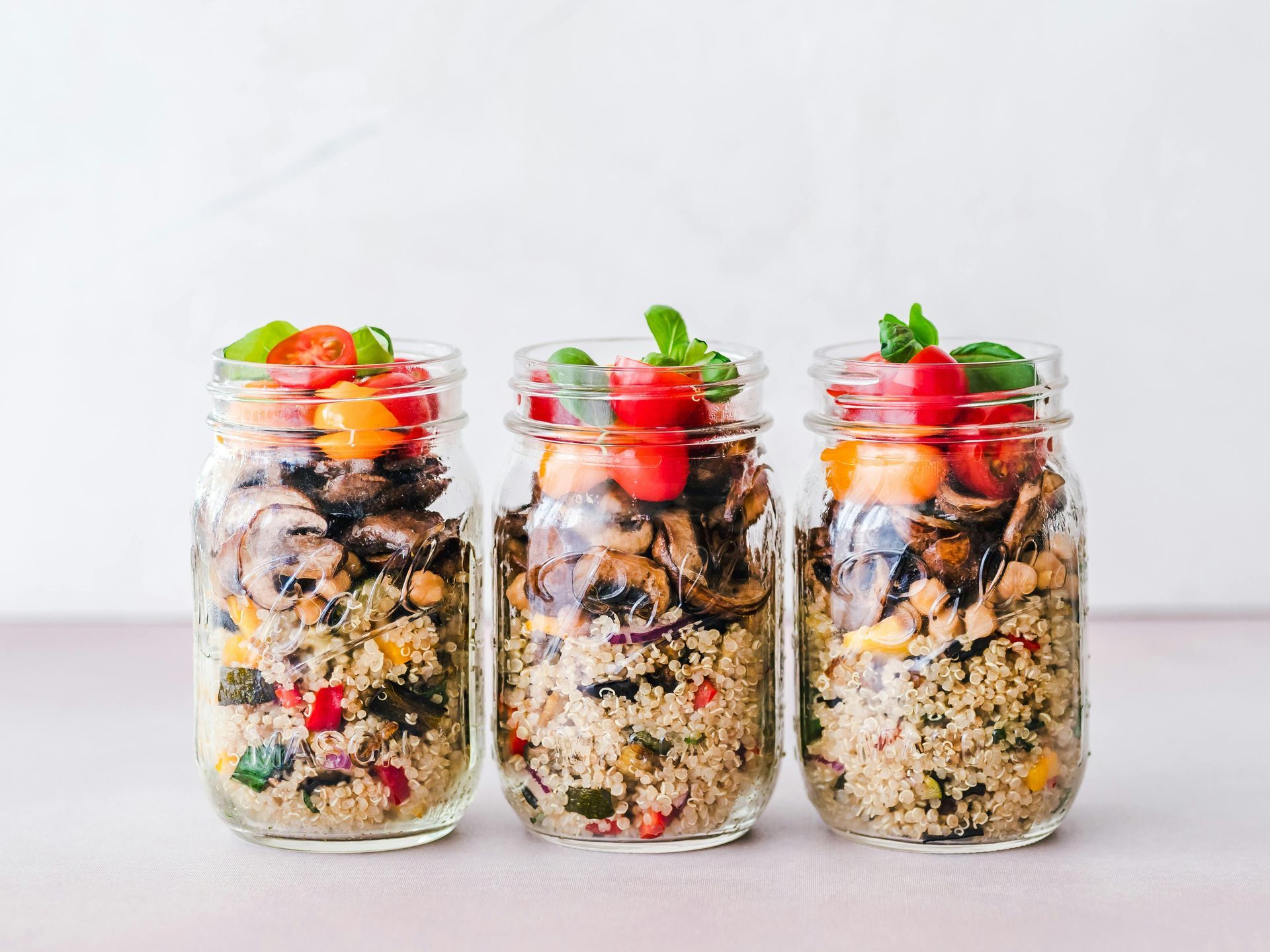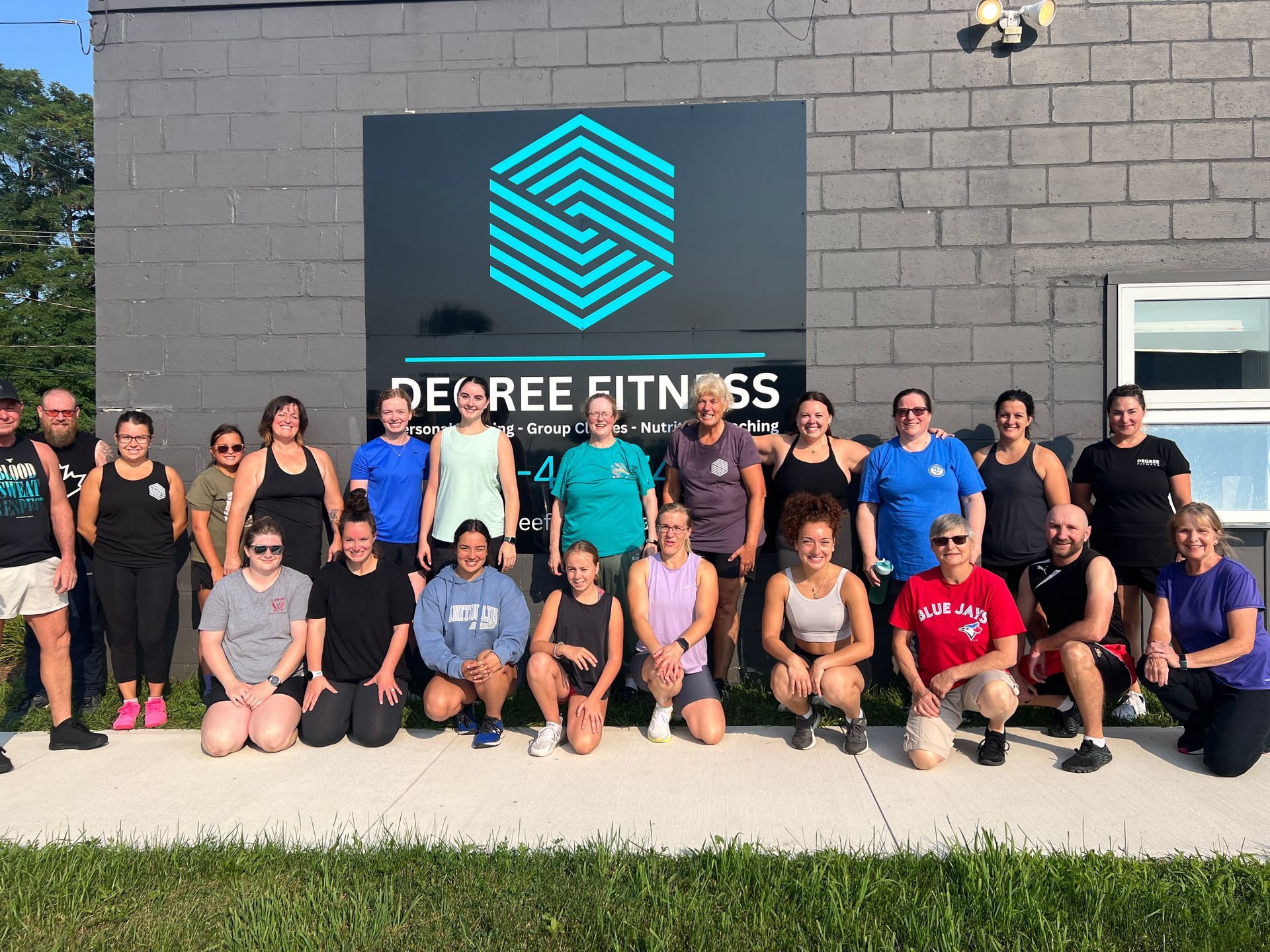Do you need to take a greens powder?
October 30, 2021
Written By: Nutrition Coach Mairead Have you heard of greens powder supplements? They've become more common in the last few years, and many people wonder if they should be taking them, or if there's a benefit.
Let's dig in!
What are "greens powders"?
These supplements are generally a powdered supplement, although sometimes you can find them in capsules or pills, that theoretically give you all the nutrition of a large serving of leafy greens and other vegetables. They are sold under many different brand names, and there's no specific standard as to what is in them, or what nutrition requirements they might meet.
They are often advertised to busy and active people as an alternative to having to actually eat your vegetables.
You might also find protein powders and meal replacement shakes that have "added greens" in them as well.
If you're not able to include enough vegetables in your diet regularly, a greens powder may be an option to help you meet your nutrition needs. These individuals are generally extreme cases, such as if someone physically does not have access to other sources of fruits and vegetables.
We all know that increasing your fruit and vegetable intake is generally a great idea, and something a lot of us struggle with, so a greens powder may seem like a quick fix! Because all greens supplements are different, it can be difficult to choose one. If you compare both the ingredient lists and the nutrition facts between greens powders, they can be completely different.
You'll also see some big numbers on those nutrition facts. You generally do not need to be taking in 700% of your recommended vitamin C intake or 367% of your vitamin B12 intake.
For each vitamin and mineral, there is usually a recommended daily allowance, which is the amount that will meet the needs of most people. The vitamins we find in very large amounts in greens powders are not generally ones that will hurt you if you take in too much, but there's not necessarily a big benefit to taking in so much more than you need.
On the flip side, these powders are also usually low in fibre for the amount of vegetables they claim to include, meaning you might be getting the vitamins and minerals, but are definitely missing the benefits of eating them as whole foods. You might be getting 700% of your vitamin C needs but only 8% of your fibre.
Greens powders can also be very expensive, especially for a food that won't actually help you feel full or give you a lot of food energy.
Finally, including a supplement such as a greens powder does not "make up for '' other nutrition issues, such as a diet that's not meeting your energy needs, low in protein, high in saturated fat, or high in processed foods.
Just because you're taking in this supplement, it doesn't mean the rest of your diet is magically healthy, unless you make changes there as well.
If you're concerned about your vegetable and fruit intake, see if there's a whole-food way you could incorporate them. Including a serving of a fruit or vegetable you enjoy at most meals or snacks is a great place to start! If you have any medical conditions or take medications that may interact with the ingredients in any supplement, it's always a good idea to talk to your doctor or dietitian before you start a new supplement.
If you're concerned about whether you're meeting your nutrition needs and are wondering if there are supplements you need to take, meeting with a dietitian is the best way to get evidence-based advice and make sure you're on the right track!
There are limited nutrition appointments available at Degree this fall! Email mairead@degreefitnessseaforth.com
for more info and to save your time slot!

Written By: Mairead, Registered Dietitian For many of us, fall brings a return to routine and a change in schedule. Maybe you have kids heading back to school, or maybe you have a more consistent work schedule after a summer of fun plans. Or maybe that old back-to-school energy just has you wanting to set some goals. Whatever it is, fall is the perfect time to get back on track with your fitness and nutrition goals! Check out these 5 ways you can work on getting back on track this fall! 1. Make sure you're drinking your water! Drinking enough water is a small step in the right direction. If you've had a busy summer, maybe hydration hasn't been top of mind! For most normal healthy people, aiming for 2-3L of water a day is a reasonable goal. If you're well below that, try aiming for just one extra glass a day and increasing slowly from there. Bonus: one small healthy change often leads to others. Drinking your water could get the ball rolling! 2. Do some meal planning! Meal planning doesn't have to be rigid or complicated. If you're constantly standing in front of the fridge at 6pm wondering what to eat, meal planning can fix that. If you're constantly stuck throwing out random ingredients you didn't know how to finish, meal plannign can fix that. If you bring home groceries but then don't know what to do with it, meal planning can fix that. If you're eating more take out than you'd like because you didn't have a plan, meal planning can fix that. Even thinking a day or two ahead can help you cut the stress at meal time! 3. Get realistic about what you can manage! Before you start overhauling everything, take a second to look at what this season really looks like for you, and what kind of health and fitness goals could be achievable. Maybe a return to routine means you can workout every day of the week now - fantastic! Maybe a change in routine means you need to explore different times to get to the gym and other ways of moving your body - also fantastic! Maybe you're home more this fall and will be cooking more - amazing! Maybe you're going to be busier and need to expore quick and healthy meal ideas - also amazing! Figuring out how to match your goals to your real life right now is key to actually making changes that stick. 4. Shop your kitchen! If your summer was busy, it's time to take stock of what's in your kitchen. Check your fridge, freezer, and pantry cupboards. Is there anything that should be used up that you can plan meals around in the next couple weeks? Are there staple items you count on for easy meals that you need to restock? Could you cut your grocery spending down for a week or two by trying to use what you have so nothing goes to waste? If you have the time for it, this is the perfect time to take stock of what you have and make the most of it! 5. Book a check-in or ask for help! Sometimes we just don't know where to start or what to do. Sometimes we're so busy living our lives that it's hard to see possible solutions to our health and fitness struggles. That's when it's time to ask for help. This might mean asking a friend for meal planning ideas or to set a regular time to go for a walk. It also might mean booking a No Sweat Intro at Degree to learn more about programs, checking in with your coach if you're feeling like something needs to change, or meeting with a Registered Dietitian to set some nutrition goals that will work for you in this season. There's nothing wrong with needing a bit of help! Looking for more personalized nutrition advice? Let's chat! Email mairead@degreefitnessseaforth.com for more information about our Nutrition Programs, or click HERE to book your FREE Bite-Sized Nutrition Chat!

Written By: Coach Sienna Showing up for yourself is so important but its often overlooked and dismissed. Showing up for yourself isn't some cheesey, made up statement. There is meaning behind it and science! Showing up for yourself is an empowering practice that can transform the way you live, love and lead! BUT what does showing up for yourself actually mean? And why does it matter so much? S howing up for yourself is... Not Selfish You matter and you are important! Treat yourself as if you were a loved one. It means honoring your own needs, values and well being to achieve overall wellness. This means being consistent in the way you treat yourself, not just when it's convenient to you! It is…. Keeping your word to yourself and keeping those promises Choosing rest to prevent burnout It means giving yourself grace and speaking kindly to yourself (Its your first time living!) Prioritizing growth even if its uncomfortable Creating boundaries and sticking with them Say No when something doesn't align with you or your beliefs I t's about treating you like you are worth caring for not only when you have “deserved it” but because you are worth that care, always! Why does all of this matter? It strengthens your relationship with yourself Prevents you for burning or crashing out Builds self confidence as well as trust in yourself Helps you stay balanced emotionally and physically The more time you spend getting to know yourself you learn and discover hobbies! You learn that YOU CAN DO IT and that YOU CAN DO HARD THINGS! You become more present for others! You are no longer pouring from an empty cup! What does this look like in real life? Drinking enough water even though you would rather skip it Going on a walk or doing meditation to have time for yourself to avoid crash out Keeping promises you said you would Letting go of perfection and simply doing the best that you can with what you've got S tart showing up for yourself today! Let yourself know that you've got you :) --- To inquire about services, programs or to get started email info@degreefitnessseaforth.com or call/text 519-441-7492!

Written By: Coach Kelly I’ve been exercising since high school... I don’t want to age myself tooooo much ;) but that was quite sometime ago. I meet with people all the time who are looking to get started. They are looking to lose weight, tone up, feel better, happier, increase bone density, do something for them, for various reasons. I’m going to give you two of the most important things that you need to do to make your fitness stick, through al season nd all set backs. Write these down, memorize them, and repeat them over and over. You’ll always succeed. Forget about motivation Seriously, forget it. Motivation comes after you get started. It comes when you start to see results; it comes when your pants fit different; it comes when you’re not out of breath going up stairs; it comes when you are running down the soccer field with your kids; it comes when you are happier; it comes when you feel less anxious, less depressed; it comes after you get started. Remember your why Why are you wanting to get started? Why do you want to spend money and time at a gym? Are you willing to do this for months, if not years? When your schedule gets busy, or your kids get sick, why will you keep coming to classes or appointments? You just need to get started, and you need to clearly understand why you are starting in the first place. After that, you must stick with it. Even when y you’re tired, when you’re frustrated, when you want to give up. Everyone wants the quick fix. We will spend hundreds, if not thousands of dollars on supplements that promise to help us lose weight, feel better, but honestly, nothing will compare to the eating some vegetables and getting in a structured workout with a Coach or at a gym 2 - 3 times per week. I know it’s hard. I know it’s hard. Like, I really, really know it’s hard. But, as you’re reading this, look way down the road, like 1 year, then 3, then 5 years. How do you want to feel? As hard as it is to get started, it will be even harder if you don’t do anything. You deserve to invest in yourself. You deserve to feel good. You have got this and we believe in you - Let’s go! ----- To inquire about services, programs or to get started email info@degreefitnessseaforth.com or call/text 519-441-7492!
